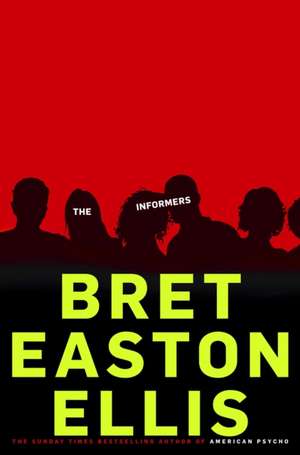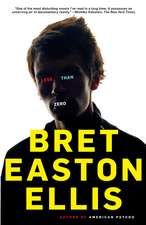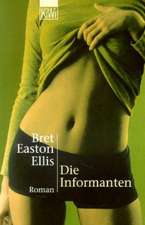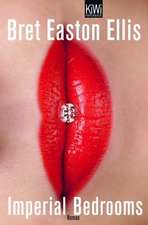The Informers
Autor Bret Easton Ellisen Limba Engleză Paperback – apr 2011
'A writer at the peak of his powers . . . The book takes us from the first to the seventh circles of hell, from Salinger to de Sade' Will Self
The Informers is a collection of short stories with intertwining characters, from the author of American Psycho and Less Than Zero, Bret Easton Ellis.
Their voices enfold us as seamlessly as those of DJs heard over a car radio. The characters go to the same schools. They eat at the same restaurants. They have sex with the same boys and girls. They buy from the same dealers.
Fusing voices into an intense, impressionistic narrative that blurs genders, generations and even identities, these stories capture the lives of a group of people, connected in the way only people in L.A. can be - suffering from nothing less than the death of the soul.
| Toate formatele și edițiile | Preț | Express |
|---|---|---|
| Paperback (2) | 43.56 lei 3-5 săpt. | +29.20 lei 7-13 zile |
| Pan Macmillan – apr 2011 | 43.56 lei 3-5 săpt. | +29.20 lei 7-13 zile |
| Vintage Publishing – 31 iul 1995 | 92.18 lei 3-5 săpt. |
Preț: 43.56 lei
Preț vechi: 63.55 lei
-31% Nou
8.33€ • 8.70$ • 6.90£
Carte disponibilă
Livrare economică 14-28 martie
Livrare express 28 februarie-06 martie pentru 39.19 lei
Specificații
ISBN-10: 033053632X
Pagini: 272
Dimensiuni: 131 x 197 x 20 mm
Greutate: 0.22 kg
Editura: Pan Macmillan
Descriere
In this incisive collection of stories, Bret Easton Ellis returns to the moral badlands of 1980s Los Angeles.
Notă biografică
Extras
BRUCE CALLS FROM MULHOLLAND
Bruce calls, stoned and sunburned, from Los Angeles and tells me that he's sorry. He tells me he's sorry for not being here, at campus with me. He tells me that I was right, that he should have flown to the workshop this summer, and he tells me that he's sorry he's not in New Hampshire and that he's sorry he hasn't called me in a week and I ask him what he's doing in Los Angeles and don't mention that it has been two months.
Bruce tells me that things went bad ever since Robert left the apartment they were sharing on Fifty-sixth and Park and went on a white-water-rafting trip with his stepfather down the Colorado River, leaving his girlfriend, Lauren, who also lives in the apartment on Fifty-sixth and Park, and Bruce alone, together, for four weeks. I have never met Lauren but I know what kind of girl Robert is attracted to and I can picture what she must look like clearly in my mind and then I'm thinking of the girls who are attracted to Robert, beautiful and pretending to ignore the fact that Robert, at twenty-two, is worth about three hundred million dollars, and I picture this girl, Lauren, lying on Robert's futon, head thrown back, Bruce moving slowly on top of her, his eyes shut tightly.
Bruce tells me that the affair started a week after Robert left. Bruce and Lauren had gone to Café Central and after they sent back the food and decided just to have drinks, they agreed it would be sex only. It would happen only because Robert had gone out West. They told each other that there really was no mutual attraction beyond the physical and then they went back to Robert's apartment and went to bed. This went on, Bruce tells me, for one week, until Lauren started dating a twenty-three-year-old real estate tycoon who is worth about two billion dollars.
Bruce tells me that he was not upset by that. But he was "slightly bothered" the weekend Lauren's brother, Marshall, who just graduated from RISD, came down and stayed at Robert's apartment on Fifty-sixth and Park. Bruce tells me that the affair between him and Marshall lasted longer simply because Marshall stayed longer. Marshall stayed a week and a half. And then Marshall went back to his ex-boyfriend's loft in SoHo when his ex-boyfriend, a young art dealer who is worth about two to three million, said he wanted Marshall to paint three functionless columns in the loft they used to share on Grand Street. Marshall is worth about four thousand dollars and some change.
This was during the period that Lauren moved all of her furniture (and some of Robert's) to the twenty-three-year-old real estate tycoon's place at the Trump Tower. It was also during this period that Robert's two expensive Egyptian lizards apparently ate some poisoned cockroaches and were found dead, one under the couch in the living room, its tail missing, the other sprawled across Robert's Betamax--the big one cost five thousand dollars, the smaller one was a gift. But since Robert is somewhere in the Grand Canyon there is no way to get in touch with him. Bruce tells me that this is why he left the apartment on Fifty-sixth and Park and went to Reynolds' house, in Los Angeles, on top of Mulholland, while Reynolds, who is worth, according to Bruce, a couple of falafels at PitaHut and no beverage, is in Las Cruces.
Lighting a joint, Bruce asks me what I have been doing, what has been happening here, that he's sorry again. I tell him about readings, receptions, that Sam slept with an editor from the Paris Review who came up from New York on Publishers' Weekend, that Madison shaved her head and Cloris thought she was having chemotherapy and sent all her stories to editors she knew at Esquire, The New Yorker, Harper's, and that it just made everyone very blah. Bruce tells me to tell Craig that he wants his guitar case back. He asked if I'm going to East Hampton to see my parents. I tell him that since the workshop is just about over and it's almost September, I don't see the point.
Last summer Bruce stayed with me at Camden and we took the workshop together and it was the summer Bruce and I would swim in Lake Parrin at night and the summer he wrote the lyrics to the theme song from "Petticoat Junction" all over my door because I would laugh whenever he sang the song not because the song was funny--it was just the way he sang it: face stern yet utterly blank. That was the summer we went to Saratoga and saw the Cars and, later that August, Bryan Metro. The summer was drunk and night and warm and the lake. An image I never saw: my cold hands running over his smooth, wet back.
Bruce tells me to touch myself, right now, in the phone booth. The house I'm in is silent. I wave away a mosquito. "I can't touch myself," I say. I slowly sink to the floor still holding the phone.
"Being rich is cool," Bruce says.
"Bruce," I'm saying. "Bruce."
He asked me about last summer. He mentions Saratoga, the lake, a night I don't remember at a bar in Pittsfield.
I don't say anything.
"Can you hear me?" he's asking.
"Yeah," I whisper.
"Is, like, the connection clear?" he asks.
I'm staring at a drawing: a cup of cappuccino overloaded with foam and beneath that two words scrawled in black: the future.
"Mellow out," Bruce sighs, finally.
After we hang up I walk back to my room and change. Reynolds picks me up at seven and as we drive to a small Chinese restaurant on the outskirts of Camden, he turns the radio down after I say Bruce called and Reynolds asks, "Did you tell him?" I don't say anything. I found out over lunch today that Reynolds is currently involved with a townie named Brandy. All I can think about is Robert on a raft, still somewhere in Arizona, looking at a small photograph of Lauren but probably not. Reynolds turns the radio up after I shake my head. I stare out the window. It's the end of summer, 1982.
2
AT THE STILL POINT
"It's been a year," Raymond says. "Exactly."
I have been hoping that no one was going to mention it but I knew as the evening went on that someone would say something. I just didn't think it was going to be Raymond. The four of us are at Mario's, a small Italian restaurant in Westwood Village, and it's a Thursday and late in August. Even though school doesn't start until early October everyone can tell that summer is ending, has ended. There is really not a lot to do. A party in Bel Air that no one expresses too much interest in going to. No concerts. None of us has a date. In fact, except for Raymond, I don't think any of us sees anyone. So the four of us--Raymond, Graham, Dirk and myself--decide to go out to dinner. I don't even realize that it has been a year "exactly" until I'm in the parking lot next door to the restaurant and almost hit a tumbleweed that blows in front of me too quickly. I park and sit in my car, realizing what the date is, and I walk very slowly, very carefully, to the door of the restaurant and pause a minute before I go in, staring at a menu encased in glass. I am the last to arrive. No one is saying a whole lot to anyone else. I try to keep what little conversation there is on other topics: new Fixx video, Vanessa Williams, how much Ghostbusters is grossing, maybe what classes we're going to take, making plans for surfing maybe the next day. Dirk resorts to telling bad jokes we all know and don't think are funny. We order. The waiter leaves. Raymond speaks.
"It's been a year. Exactly," Raymond says.
"Since what?" Dirk asks uninterestedly.
Graham looks over at me, then down.
No one says anything, not even Raymond, for a long time.
"You know," he finally says.
"No," Dirk says. "I don't."
"Yeah, you do," Graham and Raymond say at the same time.
"No, I really don't," Dirk says.
"Come on, Raymond," I say.
"No, not 'come on, Raymond.' What about 'come on, Dirk'?" Raymond says, looking at Dirk, who isn't looking at any of us. He just sits there staring at a glass of water, which has a lot of ice in it.
"Don't be a jerk," he says softly.
Raymond sits back, looking satisfied in a sad sort of way. Graham looks over at me again. I look away.
"It hasn't seemed that long," Raymond murmurs. "Has it, Tim?"
"Come on, Raymond," I say again.
"Since what?" Dirk says, finally looking at Raymond.
"You know," Raymond says. "You know, Dirk."
"No, I don't," Dirk says. "Why don't you just tell us. Just say it."
"I don't have to say it," Raymond mutters.
"You guys are being total dicks," Graham says, playing with a bread stick. He offers it to Dirk, who waves it away.
"No, come one, Raymond," Dirk says. "You brought this up. Now say it, pussy."
"Tell them to shut up or something," Graham says to me.
"You know," Raymond says weakly.
"Shut up," I sigh.
"Say it, Raymond," Dirk dares.
"Since Jamie . . ." Raymond's voice breaks. He grits his teeth, then turns away from us.
"Since Jamie what?" Dirk asked, his voice rising, getting higher. "Since Jamie what, Raymond?"
"You guys are being total dicks." Graham laughs. "Why don't you just shut up or something."
Raymond whispers something that none of us can hear.
"What?" Dirk asks. "What did you say?"
"Since Jamie died," Raymond finally admits, mumbling.
For some reason this shuts Dirk up and he sits back, smiling, as the waiter places food on the table. I don't want garbanzo beans in my salad and I had warned the waiter about this when we ordered but it seems inappropriate to say anything. The waiter places a plate of mozzarella marinara in front of Raymond. Raymond stares at it. The waiter leaves, returns with our drinks. Raymond keeps staring at his mozzarella marinara. The waiter asks if everything is all right. Graham is the only one of us who nods.
"He always ordered this," Raymond says.
"For Christ sakes, mellow out," Dirk says. "Then order something else. Order the abalone."
"The abalone is very good," the waiter says, before leaving. "So are the grapes."
"I can't believe you're acting this way," Raymond says.
"What way? That I'm not acting like you?" Dirk picks up his fork, then puts it back down for the third time.
Raymond says, "That you seem like you just don't give a shit."
"Maybe I don't. Jamie was a jerk. A nice guy but he was a jerk too, okay?" Dirk says. "It's all over. Don't fucking dwell on it."
"He was one of your best friends," Raymond says accusingly.
"He was a jerk and he was not one of my best friends," Dirk says, laughing.
"You were his best friend, Dirk," Raymond says. "Don't act now like you weren't."
"He mentioned me on his yearbook page--big deal." Dirk shrugs. "That's about it." Pause. "He was a little jerk."
"You don't care."
"That he's dead?" Dirk asks. "He's been dead a year, Raymond."
"I can't believe you don't give a shit is all."
"If giving a shit means sitting around here crying like some fag about it . . ." Dirk sighs, then says, "Look, Raymond. It was a long time ago."
"It's only been a year," Raymond says.
Things I remember about Jamie: getting high with him at an Oingo Boingo concert in eleventh grade. Drunk on the beach in Malibu at a party at an Iranian classmate's house. A lame trick he played on some frat guys from USC at a party in Palm Springs, which actually injured Tad Williams pretty badly. I don't remember the joke but I remember Raymond, Jamie and myself stumbling down one of the corridors of the Hilton Riviera, all three of us stoned, Christmas decorations, someone losing an eyeball, a fire truck arriving too late, a sign above a door that said "DO NOT ENTER." Doing okay coke on a yacht with him on prom night and him telling me that I was easily his best friend. Doing another line off a black enamel table, I had asked about Dirk, about Graham, Raymond, a couple of movie stars. Jamie said he liked Dirk and Graham and that he didn't like Raymond a whole lot. "Dude is bogus" were his exact words. Another line and he said that he understood me or something like that and I did another line and believed him because it is easier to move through the motions than not to.
One night late in August, on the way to Palm Springs, Jamie tried to light a joint and either lost control of the car because he was speeding or had a blowout and the BMW flew off the freeway and he was killed instantly. Dirk had been following him. They were going to spend the weekend before Labor Day at Jeffrey's parents' place in Rancho Mirage and they had left a party we had all been at in Studio City and it was Dirk who had pulled Jamie's crushed, bloody body from the car and who had waved down some guy who was on his way to Las Vegas to build a tennis court and the guy drove to the nearest hospital and an ambulance arrived seventy minutes later and Dirk had sat there in the desert staring at the dead body. Dirk never spoke about it a lot, just little details he gave us the week after it happened: the way the BMW tumbled, rolled across sand, a smashed cactus, how the upper part of Jamie's body burst through the windshield, the way Dirk pulled him out, laid him down, looked through Jamie's pockets for another joint. I have been tempted a lot of times to go out to where it happened and check it out but I don't go out to Palm Springs anymore because whenever I'm there I feel very wasted and it's a drag.
"I just can't believe you guys don't care," Raymond is saying.
"Raymond," Dirk and I say in unison.
"It's just that there's nothing we can do," I finish.
"Yeah." Dirk shrugs. "What can we do?"
"They're right, Raymond," Graham says. "Things are blurry."
"In fact I feel like a big smudge," Dirk says.
I look over at Raymond and then back at Dirk.
"He's dead and all but that doesn't mean he wasn't a jerk," Dirk says, pushing his plate away.
Recenzii
“A post-modern Winesburg, Ohio. . . . Ellis's cleverness is on full display. . . . He has a keen ear for dialogue, a sharp eye for the moral bankruptcy of modern life, and a vivid imagination.” —San Francisco Chronicle
“The Informers is spare, austere, elegantly designed, telling in detail, coolly ferocious, sardonic in its humor; every vestige of authorial sentiment is expunged. . . . Truly unsettling.” —The New York Times Book Review
“Bret Easton Ellis. . . is an extremely traditional and very serious American novelist. He is the model of literary filial piety, counting among his parents Ernest Hemingway, F. Scott Fitzgerald, Nathanael West, and Joan Didion.” —The Washington Post














